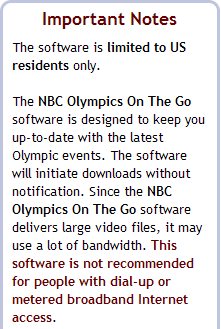
Cable's Fear Factor: the Online Video Threat
[Updated 12:11pm EDT: Scott McNulty from Comcast notes in our comment section that the TV Everywhere concept will count against the 250GB usage allowance Comcast grants residential broadband customers, and suggests the concept is non-exclusive and voluntary. We debate Scott on that point — see the Comments below the article to follow along and add your thoughts.]
The best kept secret in the broadband industry is now out. Stop the Cap! reader Lou dropped us a note to say the New York Times has decided to let cable’s big secret out of the bag in an article published today entitled, “Cable TV’s Big Worry: Taming the Web.” Lou writes, “finally, the mainstream media is pointing out that the real threat to Time Warner Cable and others is Hulu.”
In addition to the obsession to “monetize” content that is currently given away for free online, many in the cable industry believe the best way to tame the web is to control the content and method of distribution. If you subscribe to a cable TV package, you’re approved. If you don’t, no online video for you! Once accessibility is limited to those “authenticated” to access the content, a handful of companies can determine exactly who can obtain their video programming, for how long, and at what price. For everyone else not going along, discouraging ‘unauthorized’ viewing and disrupting underground distribution are powerful tools for providers to protect their video business model.
What is the best way to do that? Internet Overcharging schemes of course. By raising the alarm that online video growth will create a tsunami-like wave of Internet brownouts and traffic jams, and by trying to pit subscribers against one another based on perceptions of their usage, the message that will be part of any cable industry “education” campaign is that limits, tiers, fees, and penalties are the answer to all of these problems. Watching Hulu every night? Naughty. With this 20GB monthly limit, we’ll put a stop to that. Netflix movie tonight? Do you really want to risk going over your allowance and incurring “necessary” overlimit fees and penalties that represent more than 1,000% markup over our actual costs? Wouldn’t it be fairer to your neighbors to watch HBO on your cable package instead?
Is it Fair for Big Trucks to Pay More On the Information Superhighway Because They’ll Wear It Out Faster?
In cities across the country, those interested in Internet Overcharging schemes are already engaged in focus group testing. We know, because some of our readers have been stealth participants, informing us about all of their pretzel-like logic twisting games designed to convince the public that cable and telephone companies are not going to gouge you again with a higher bill. Some want to use toll road analogies, others are using gas and electric comparisons, and one had the novel idea of putting a plate of food in the middle of the conference table and asking if it would be fair for just one person to eat 75% of it while the rest “go hungry.”
Unfortunately for them, by the end of the session, two of our readers attending two different panels derailed their efforts and had panels eating out of their hands in opposition to Internet Overcharging schemes, and collected a nice $75 (and uncapped lunch) for their efforts.
The Times piece only adds more evidence to help make the case that Internet Overcharging schemes aren’t about broadband fairness — they are part of a protection racket to protect fat profits earned from selling video packages to consumers.
Aware of how print, music and broadcast television have suffered severe business erosion, the chief executives of the major media conglomerates like Time Warner, Viacom and NBC Universal have made protecting cable TV from the ravages of the Internet perhaps their top priority.
“The majority of profits for the big entertainment companies is from cable programming,” said Stephen B. Burke, the president of Comcast, the nation’s largest cable company.
The major worry is that if cable networks do not protect the fees from paying subscribers, and offer most programming online at no cost — as newspapers have done — then customers may eventually cancel their cable subscriptions.
It’s My Cousin’s Fault
In other words, you and I are probably not the biggest threat the industry faces from the ultimate nightmare of eroding profits. It’s really my cousin’s fault. He, like many in their 20s, moved into his new home and didn’t do what many of us routinely did when we moved — start the newspaper service, connect the telephone line, and get the cable TV hooked up.
He did call Time Warner Cable — to only install Road Runner broadband Internet service. He reads the news online, relies exclusively on a cell phone, and watches DVD’s and online video on his giant flat panel television.
The cable industry is horrified my cousin represents their future.
There is no sign of that happening anytime soon, but a recent poll by the Sanford C. Bernstein research group found that about 35 percent of people who watch videos online might cut their cable subscription within five years.
“We don’t think that it’s a problem now, but we do feel a sense of urgency,” Mr. Burke said.
An Urgency to Overcharge
Like most industries that have grown fat and happy on their traditional business models, the most common first response to a challenge to that model is to resist it. The cable industry in particular has enjoyed a largesse of profits earned from years of de facto monopoly status in most communities, with the majority of its services being largely unregulated. Cable rate increases have almost always exceeded the rate of inflation, and the public relations talking points for those rate increases has always been, “due to increased programming costs, which represent the increasing diversity and excellence of the cable channels we provide you….”
With prices for “basic/standard service” cable now approaching $60 a month, many younger customers just aren’t interested anymore.
Watching consumers abandon cable television packages for access through broadband gives executives and Wall Street analysts like Sanford C. Bernstein heartburn. Until recently, many customers never contemplated the idea of getting rid of video packages and just keeping the broadband service they already have. Not until Hulu. That one website now represents a considerable amount of online video traffic from subscribers, and the cable industry isn’t in control of it, much less profiting from it.
Hulu represents a threat to be resisted.
You Use Too Much Internet, So We’ll Create Something That Will Make You Use More
To be fair to everyone, we have to get rid of the flat rate plan you’ve enjoyed for more than a decade and replace it with tiered pricing to be “fair” to subscribers because of enormous traffic growth. That what Time Warner Cable customers heard during a planned nonsensical trial of an Internet Overcharging scheme in four American cities, rapidly shelved when consumers rebelled and New York Congressman Eric Massa and Senator Charles Schumer got interested (Rochester, NY was a selected trial city).
It becomes all the more ludicrous as subscribers learn Time Warner Cable’s answer to the traffic jam is to add even more traffic… their traffic… onto their broadband lines.
Evidently online video is only a crisis requiring urgent action when it isn’t their online video.
One idea, advanced most vocally by Jeffrey L. Bewkes, the chairman of Time Warner, and embraced by many executives, would be to offer cable shows online for no extra charge, provided a viewer is first authenticated as a cable or satellite subscriber.
Mr. Bewkes has called the idea “TV Everywhere,” but others in the industry refer to it by other names: “authentication,” “entitlement,” and Comcast has called its coming service “OnDemand Online.”
“If you look at TV viewing, it’s up, even though the questions and stories are all about the role of video games and Internet usage and other uses of time,” Mr. Bewkes said.
The first test of the new system, which will authenticate cable subscribers online and make available programs on the Web for no additional charge, will be announced Wednesday, between Comcast and Time Warner. The trial will involve about 5,000 Comcast subscribers, and television shows from the Time Warner networks TNT and TBS.
It will be interesting to watch whether or not “no additional charge” means such content will be exempted from Comcast’s 250GB monthly usage limit, and whether Time Warner Cable will change their Subscriber Agreement to exempt their TV Everywhere service from the existing language in their agreement permitting Internet Overcharging schemes. Time Warner Cable already exempts their “Digital Phone” product.
Ixnay on the Coin Chatter Already
The Times piece also raises eyebrows about the potential for collusion and antitrust violations in secretive meetings among industry executives, although they deny it.
The electronic media chiefs, including Mr. Bewkes, Jeff Zucker of NBC Universal and Philippe P. Dauman of Viacom, among others, have been more careful, so as to avoid being accused of collusion: much of the discussions have been on the telephone and in private, one-on-one chats during industry events. Pricing is rarely, if ever, discussed, according to executives involved in the discussions.
“We can’t get together and talk about business terms, but we can get together to work on setting open technology standards,” said Mr. Dauman, the chief executive at Viacom, which owns cable networks like MTV, VH1, Comedy Central and BET.
Although the representations from the industry seem benign, the potential for something far worse is always there. Control the keys to unlock the door to online video (and the tools to lock out or limit the “other guy”), and you’ve got a plan to make sure people don’t dare drop their cable video package. Where did the online video go from your favorite cable channel website? It’s on TV Everywhere, and you don’t get in without an invitation.
One holdout among the major chief executives appears to be Robert A. Iger of the Walt Disney Company. At an industry conference this year he warned that gambits like TV Everywhere could be “anti-consumer and anti-technology” because such a plan would place cable programming behind a pay wall.
So much for “no extra charge.”
It’s Time to Investigate
Rep. Eric Massa (D-NY), is the House of Representatives’ watchdog on this issue. He’s already connected the dots and realizes they lead in only one direction — to consumers’ pocketbooks. Massa has introduced HR 2902, the Broadband Internet Fairness Act, specifically to prevent broadband providers from falling all over themselves to engage in anti-competitive, anti-consumer price gouging, all to cover their bottom lines.
This legislation, and Rep. Massa, needs your immediate support. Call Congress and ask your representative to co-sponsor this vitally important bill. The New York congressman is protecting consumers nationwide, and deserves your thanks and support.
Stop the Cap! also now calls on Congress and the appropriate regulatory bodies to begin an immediate investigation into the industry’s “cooperation” to launch TV Everywhere, and other similar projects. Specifically, we ask that an appropriate and thorough review be conducted to ensure that no collusion or antitrust violations have, are, or will take place as a result of this project. We also call for a review of the “authentication” model proposed by the cable industry to ensure it does not exclude any consumer that subscribes to a competing video provider (satellite, telephone company, competing independent cable company, municipally owned provider, etc.), and that no “free pass” language be permitted that exempts their project from the terms and conditions that they seek to impose on others not affiliated with this project.
Senator Schumer’s long history of consumer protection would make him an excellent choice to lead such an investigation.
Once again, Net Neutrality must be the law of America’s online land. Only with the assurance of a level playing field can we be certain no provider will attempt to exert influence or special favor over content they own, control, or distribute.
 Some additional details are emerging about the content partners and networks likely to participate in the joint Time Warner Cable-Comcast TV Everywhere (as long as you are a pay cable/telco video/satellite TV subscriber) partnership.
Some additional details are emerging about the content partners and networks likely to participate in the joint Time Warner Cable-Comcast TV Everywhere (as long as you are a pay cable/telco video/satellite TV subscriber) partnership.

 Subscribe
Subscribe



